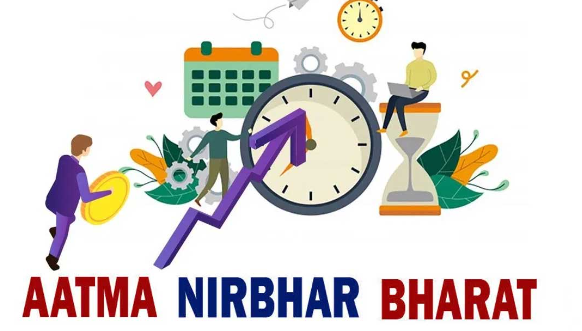Aatmanirbhar Bharat
Aatmanirbhar Bharat (which is translated in English as ‘self-reliant India’ or ‘self-sufficient India’) is a policy initiative introduced by the Government of India in May 2020, with the aim of making India “a bigger and more important part of the global economy”, pursuing policies that are efficient, competitive and resilient, and being self-sustaining and self-generating. The first mention of this came in the form of the ‘Atmanirbhar Bharat Abhiyan’ or ‘Self-Reliant India Mission’ during the announcement of India’s COVID-19 pandemic related economic package on 12 May 2020.
Background
The COVID-19 pandemic and the resultant lockdown had a severe impact on the Indian economy, with GDP contracting by a record 23.9% in Q1 FY2020-21. This economic fallout provided the backdrop for the Aatmanirbhar Bharat initiative. The initiative also came amid a rising chorus for boycotting Chinese goods and calls for reducing India’s dependence on imports.
Five Pillars
The Aatmanirbhar Bharat Abhiyan rests on five pillars:
- Economy: An economy that brings quantum jump rather than incremental change.
- Infrastructure: An infrastructure that becomes the identity of modern India.
- System: A system that is driven by technology and can fulfill the dreams of the 21st century.
- Vibrant Demography: Vibrant demography of the largest democracy is our strength.
- Demand: The cycle of demand and supply chain in our economy, the strength of our demand and supply chain is to be harnessed to its full potential.
Key Initiatives
Some of the key initiatives under Aatmanirbhar Bharat include:
Production Linked Incentive (PLI) Scheme
The PLI scheme was introduced to boost domestic manufacturing and attract foreign investment in 13 key sectors, with an outlay of Rs 1.97 lakh crore over the next five years. These sectors include advanced chemistry cell (ACC) battery, electronic/technology products, automobiles & auto components, pharmaceuticals, telecom & networking products, textile products, food products, high efficiency solar PV modules, white goods (ACs & LED), and specialty steel.
Vocal for Local
The ‘Vocal for Local’ campaign is aimed at promoting local products and services, and making them globally competitive. This includes measures like increasing import duties to discourage imports, government procurement from local suppliers, and encouraging consumers to buy local products.
Ease of Doing Business Reforms
Several measures have been taken to improve the ease of doing business in India, such as simplification of labor laws, decriminalization of minor offenses under the Companies Act, 2013, and the introduction of a single window clearance system for approvals and permissions.
Agriculture Reforms
Three new farm laws were introduced in September 2020 to liberalize the agriculture sector – the Farmers’ Produce Trade and Commerce (Promotion and Facilitation) Act, 2020, the Farmers (Empowerment and Protection) Agreement on Price Assurance and Farm Services Act, 2020, and the Essential Commodities (Amendment) Act, 2020. However, these laws were met with widespread protests from farmers and were eventually repealed in November 2021.
Progress
According to government data, India’s merchandise exports in FY2021-22 were the highest ever at $417.81 billion, surpassing the previous high of $330.07 billion in FY2018-19. The PLI scheme has also started showing results, with several global companies like Apple, Samsung, Foxconn, and Pegatron announcing plans to set up or expand manufacturing in India.
However, challenges remain. India’s trade deficit has also widened to a record high, and the country remains dependent on imports for several critical goods like oil, electronics, and machinery. The share of manufacturing in India’s GDP has also remained stagnant at around 16-17% over the last decade.


